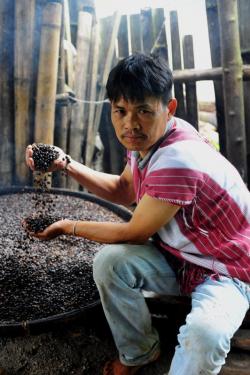A change has long been brewing in a remote village on Chiang Mai's Doi Inthanon and it's all down to one Karen man's mission to help his community by growing coffee.

Somsak Sriphumthong.
If you are a coffee lover and are travelling to the area, then a short visit to Ban Mae Klang Luang for a cup of pure Arabica coffee comes highly recommended. In fact, you can drink as much as you want as the local coffee brand Tho-bibe is served for free.
"My coffee may not be the best one around here, but I want to make Arabica coffee affordable for everyone," explains Somsak Sriphumthong on why he chose to enter the coffee industry.
Somsak is the owner of Tho-bibe Coffee. His office is a homemade humble thatch roof hut, around 1km from the main road to Doi Inthanon hut. At most times during the day, visitors can see smoke rising from a clay stove while he boils the coffee. The roasting machine is at the back and apart from the sounds of machinery, the area is usually quiet all day long.
Each month, Somsak sells 400-500kg of roasted coffee all across the country. For remote clients, he sends the beans through a parcel service without extra charge.
The temperate climates of Doi Inthanon (owing to its elevation of 1,000m above sea level) means it is an ideal place to grow Arabica coffee, much like it was for growing opium crops in the past.
When HM the King visited Doi Inthanon in the 70s and introduced coffee plantations to the Karen community, Somsak knew right away that he would strictly follow His Majesty's advice.
"HM the King studied it thoroughly, so I had to accept this. Coffee is the best crop here, if we grow it right," said Somsak.
Growing coffee instead of opium is not the only change that Somsak has seen in his life. When he was a child, people also cut down trees for wood and hunted wildlife. He recalls that in the past Doi Inthanon suffered quite severely from deforestation.
Somsak recalls that the village headman at that time was so proud of his opium crop that he asked HM the King to come and see his plantation, right in the middle of the village.
"His Majesty did visit the opium farm," he laughed.
Somsak learned by doing and actually built his own roasting machines; adapted from a big fuel tank and old motor parts.
"We grow the coffee plants in a lush forest without the use of chemicals. I buy these coffee beans from farmers I know and although I can find them cheaper from other farmers, these farmers are cutting down trees to make way for the plants and are also using chemicals in their coffee plantations, so it is something that I have always refused. It is not worth it.
"If coffee farms expand without responsibility, it can lead to deforestation, chemical contamination and many more problems," explained Somsak, adding: "When Bangkok was badly flooded two years ago, I could not sell a single coffee bean for months on end."
After the establishment of the crop substitution Royal Project in 1979 onwards, life began to return to normal on Doi Inthanon. The tireless work of park rangers, however, was not enough to revive the forest. Due to the impoverished situation of many from the Karen community, many Karen people simply continued cutting down trees, growing opium and hunting wild animals. In 1999, Somsak was struck with the idea of creating more jobs and generating more income for his neighbours by offering tourist accommodation. At first, the idea was almost unanimously opposed
"They said my idea was crazy and thought nobody would want to come," remembered Somsak.
Somsak persisted however and after a while many of his neighbours began to see the potential of the idea.
After a while and as a number of homestay options and different types of accommodation were introduced to the village, more and more tourists began to stop by. The stunning views and scenery of the Ban Mae Klang Luang rice paddies were shared around different social networks.
The picturesque location of Ban Mae Klang Luang has now even been used in TV series and films. This led to even more tourists flocking to the village. It was only then, Somsak remarked, that villagers stopped the activities that were leading to deforestation and made the switch to tourism-related businesses. Even the hunters in the village now work as tourist guides.
"Everyone who originally opposed my idea has now developed their own bungalow business. Now, there are 14 operators in the village."
Part of the revenue generated from the different homestays goes to the local authorities which then goes back into the village and is spent on development and infrastructure.
It took decades for Ban Mae Klang Luang to get to the point where it is now: a model village that is often studied by government and NGO bodies. In 2007, it even won the Most Outstanding Community-based Tourism Award.
Not bad for a former opium village.
